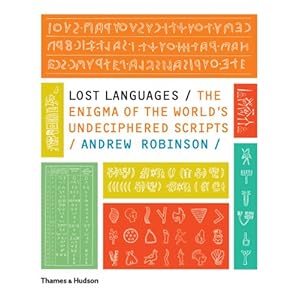'Lost Languages' is a bit of a misnomer in this case. 'Lost Writing Systems' would've been a more accurate if less poetic title. While lost languages often walk hand in hand with lost writing systems, that isn't always expressly the case, as Robinson makes clear. For example, the famous case of the decipherment of Linear B showed that the Linear B tablets recorded a very archaic form of Greek. Likewise, ancient Egyptian hieroglyphs expressed a form of archaic Egyptian quite similar to Coptic, which was still a living (if only strictly liturgical) language. This isn't a book about the lost languages, it's a book about lost writing systems (in the sense that their meaning is largely lost to us), and about attempts at decipherment. What makes this book fascinating is how culture often seems to inform the decipherment of scripts. As such, Robinson throws in a lot about the history of each culture, as well as the technical details of decipherment. Robinson gives us a taste of the history of writing, bringing to life a human need that has spanned the ages.
This need is the need to organise, record and remember, and it is the single most fascinating thing about this book. People say we now live in an 'Information Society'; but I believe that we always have, just in ways that have been limited by the available tools and infrastructure around us. This desire to order and make sense of our world has led to the invention of many hundreds of different scripts, of varying degrees of complexity and efficiency (Robinson highlights the fact that Japanese is the most inefficient writing system in the world, yet Japan has one of the world's highest levels of literacy). Throughout time, human ingenuity has been funnelled into the activity of writing and recording, even if it means re-inventing the wheel again and again.
 |
| The mysterious rongorongo script. |
 |
| An Indus Valley seal. |


No comments:
Post a Comment